We’ve all been told to focus on the 10 best foods for prostate health, but what if you’ve been lied to?
What if some of the foods you think are protecting your prostate are actually doing more harm than good?
Certain “healthy” foods could be making your prostate problems worse.
In fact, these seemingly innocent choices might be fueling inflammation, increasing your cancer risk, and silently damaging your prostate.
It’s time to uncover the ten worst foods for prostate health, and you may be shocked to find some of your go-to staples on this list.
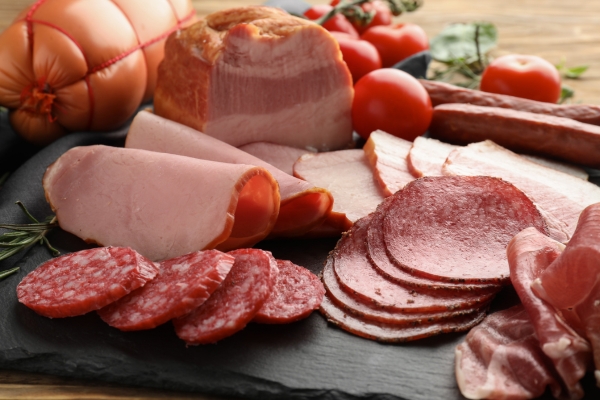
1. Processed Meats
Processed meats are loaded with unhealthy fats, excessive sodium, and harmful preservatives, all of which can create the perfect storm for prostate inflammation.
The high levels of saturated fats increase the production of pro-inflammatory chemicals in the body, while sodium can raise blood pressure, negatively affecting overall circulation—including blood flow to the prostate.
Nitrates and other preservatives found in these meats have been linked to an increased risk of certain cancers, including prostate cancer.
When consumed regularly, processed meats contribute to chronic inflammation, a key factor in prostate issues and the development of more serious conditions. [1]
Examples of processed meats include the following:
- Hot dogs
- Sausages (including breakfast sausages and bratwurst)
- Bacon
- Deli meats (ham, turkey, salami, bologna)
- Pepperoni
- Corned beef
- Pastrami
- Beef jerky
- Canned meats (such as spam)
- Meat sticks (like Slim Jims)
- Pâté and liverwurst
- Smoked meats (smoked ham, smoked sausages)

2. Dairy Products
Dairy products, especially full-fat versions, have been linked to higher risks of prostate cancer due to their hormone content and high levels of saturated fats.
Many dairy products contain estrogen and other hormones that can potentially disrupt the hormonal balance in men, leading to an increased risk of prostate issues.
The saturated fats in dairy can promote inflammation, a known contributor to prostate problems.
Some studies have even suggested that excessive dairy intake may accelerate the growth of prostate cancer cells.
While moderation is key, frequent consumption of high-fat dairy should be avoided for optimal prostate health. [2]
Examples of dairy products include the following:
- Full-fat milk
- Cheese (cheddar, mozzarella, brie, blue cheese, etc.)
- Butter
- Cream
- Ice cream
- Full-fat yogurt
- Sour cream
- Heavy whipping cream
- Cottage cheese
- Cream cheese
- Half-and-half
- Flavored coffee creamers (often contain dairy and added sugars)

3. Red Meat
Red meat is notorious for being high in saturated fats, which are directly linked to an increased risk of cancer, including prostate cancer.
Saturated fats not only promote inflammation throughout the body but also contribute to the production of harmful compounds during digestion, especially when meat is cooked at high temperatures (like grilling or frying).
These compounds can damage cells and lead to mutations that increase cancer risk.
In addition, frequent consumption of red meat has been associated with higher levels of insulin-like growth factors, which may stimulate the growth of prostate cancer cells.
Reducing or eliminating red meat from your diet is one way to help safeguard your prostate health. [1]
Examples of red meat include the following:
- Beef (steaks, burgers, roasts, brisket, ground beef)
- Lamb (chops, leg of lamb, ground lamb)
- Pork (chops, bacon, ham, sausage, ribs, pork belly)
- Veal (cutlets, chops, ground veal)
- Venison (steaks, ground venison, roasts)
- Goat (stews, goat chops, goat curry)
- Mutton
- Bison (ground bison, bison steaks)
- Duck (especially the fatty cuts)
- Boar
- Elk
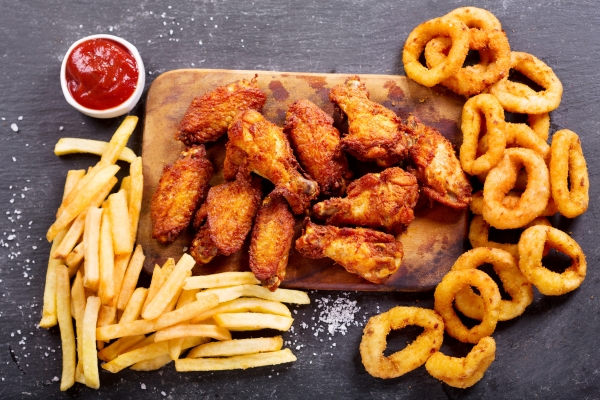
4. Fried Foods
Fried foods are a major contributor to inflammation and oxidative stress in the body, both of which can negatively impact prostate health.
The high temperatures used in deep-frying produce harmful trans fats, which are notorious for increasing inflammation and contributing to the development of chronic diseases, including cancer.
In addition, fried foods are often cooked in oils that break down into toxic compounds when heated, further promoting oxidative stress.
This damage can exacerbate prostate problems, increasing the risk of prostate cancer and other inflammatory conditions.
Regular consumption of fried foods can also lead to weight gain and metabolic issues, both of which are linked to poor prostate health. [3]
Examples of fried foods include the following:
- French fries
- Fried chicken (chicken wings, chicken tenders, drumsticks)
- Fried fish (fish sticks, fried catfish, fried cod)
- Fried shrimp
- Onion rings
- Potato chips
- Mozzarella sticks
- Doughnuts
- Tempura (vegetables, shrimp)
- Fried calamari
- Churros
- Egg rolls
- Samosas
- Fried dumplings
- Fried pork rinds
- Funnel cakes
- Corn dogs
- Jalapeño poppers
- Hushpuppies
- Fried pickles

5. Alcohol
Excessive alcohol consumption can disrupt hormone balance and increase inflammation in the body, both of which can negatively affect prostate health.
Alcohol, particularly when consumed in large quantities, has been shown to alter testosterone and estrogen levels, creating an imbalance that can contribute to prostate problems.
Chronic drinking also promotes systemic inflammation, which is linked to a higher risk of prostate cancer and benign prostatic hyperplasia (BPH).
Furthermore, alcohol can impair liver function, leading to a buildup of toxins in the body, which adds additional stress to the prostate.
Moderation is key, as even small amounts of alcohol over time can exacerbate prostate issues. [4]
Examples of alcohol include the following:
- Beer (lager, ale, stout, pilsner, porter)
- Wine (red wine, white wine, rosé, sparkling wine, champagne)
- Spirits (vodka, gin, whiskey, rum, tequila, bourbon)
- Hard cider
- Hard seltzer
- Cocktails (margaritas, martinis, mojitos, cosmopolitans)
- Liqueurs (Baileys, Kahlúa, Grand Marnier, Amaretto)
- Mixed drinks (rum and Coke, whiskey sour, gin and tonic)
- Craft beers (IPAs, pale ales, double IPAs)
- Fortified wines (sherry, port, vermouth)
- Flavored spirits (flavored vodka, whiskey with honey)
- Shooters and shots (Jägermeister, Fireball, Sambuca)
- Sangria
- Mulled wine
- Alcoholic punches (Jungle Juice, Long Island Iced Tea)
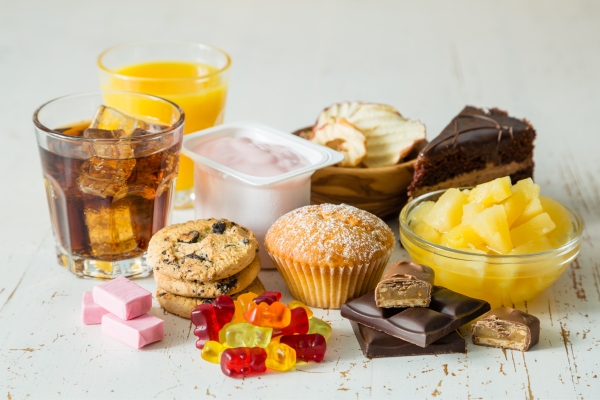
6. Refined Sugars
Refined sugars are a significant contributor to insulin resistance and chronic inflammation, both of which can exacerbate prostate issues.
When you consume excessive amounts of sugar, your body struggles to regulate insulin levels, leading to insulin resistance—a condition closely linked to obesity, metabolic syndrome, and inflammation.
This state of chronic inflammation can worsen prostate problems, increase the risk of benign prostatic hyperplasia (BPH), and contribute to the development of prostate cancer.
High sugar intake weakens the immune system, making it harder for the body to fight off inflammation and illness, including conditions affecting the prostate. [5]
Examples of refined sugar foods include the following:
- Candy (chocolates, gummies, hard candy)
- Pastries (donuts, croissants, Danish pastries)
- Sodas and soft drinks (cola, lemon-lime soda, root beer)
- Sugary cereals (Frosted Flakes, Froot Loops, Cap’n Crunch)
- Cakes and cupcakes
- Cookies (chocolate chip, oatmeal, sugar cookies)
- Ice cream and frozen desserts
- Sweetened yogurt
- Jams and jellies
- Energy drinks (Monster, Red Bull)
- Sweetened coffee drinks (mocha, caramel lattes)
- Sweetened teas (bottled sweet tea, chai lattes)
- Pies (apple pie, cherry pie, pecan pie)
- Brownies and fudge
- Syrups (maple syrup, pancake syrup, flavored coffee syrups)
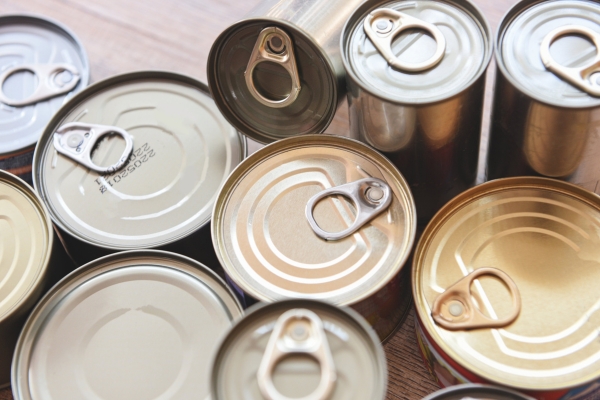
7. Canned Foods
Many canned foods contain bisphenol A (BPA) in the lining of the can, a chemical linked to hormone disruption.
BPA can mimic estrogen in the body, throwing off the delicate hormonal balance that is crucial for maintaining prostate health.
This hormone imbalance is especially concerning because it has been associated with an increased risk of prostate cancer and other prostate-related issues.
The process of canning often involves high levels of sodium and preservatives, which can contribute to inflammation, further complicating prostate health. [6]
Examples of canned foods include the following:
- Canned tomatoes (diced, crushed, whole)
- Canned soups (chicken noodle, tomato soup, cream-based soups)
- Canned vegetables (corn, green beans, peas, carrots)
- Canned beans (black beans, kidney beans, pinto beans)
- Canned fruit (peaches, pears, pineapples in syrup)
- Canned fish (tuna, salmon, sardines)
- Canned chili and stews
- Canned pasta (spaghetti, ravioli)
- Canned sauces (pasta sauce, enchilada sauce)
- Canned meats (chicken, beef, corned beef)
- Canned evaporated milk
- Canned coconut milk
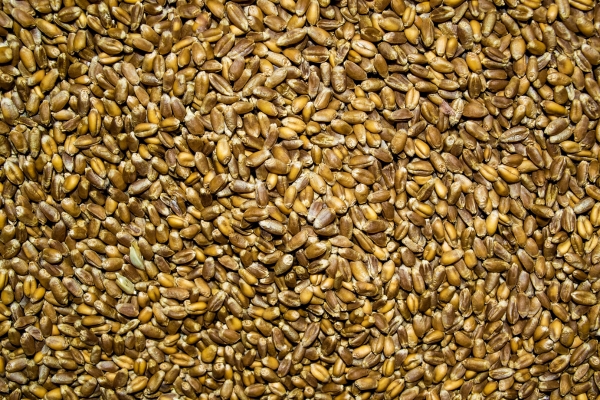
8. Processed Grains
Processed grains have been stripped of their natural nutrients and fiber, leaving behind refined carbohydrates that offer little nutritional value.
These “empty” calories can spike blood sugar levels, leading to insulin resistance, which is linked to inflammation and obesity—both of which are risk factors for poor prostate health.
The lack of fiber in processed grains also contributes to digestive issues, which can affect overall well-being and prostate function.
Regular consumption of processed grains can worsen inflammation, a critical factor in the development of prostate issues, including benign prostatic hyperplasia (BPH) and prostate cancer. [7]
Examples:
- White bread
- White rice
- Pasta made from refined flour
- Bagels
- Crackers (saltines, club crackers, graham crackers)
- Pretzels
- Instant oatmeal (flavored or sugary varieties)
- Pancakes and waffles made from refined flour
- Muffins and pastries made with white flour
- Couscous (regular, not whole wheat)
- Processed tortillas (flour tortillas, non-whole grain varieties)
- White flour-based pizza dough
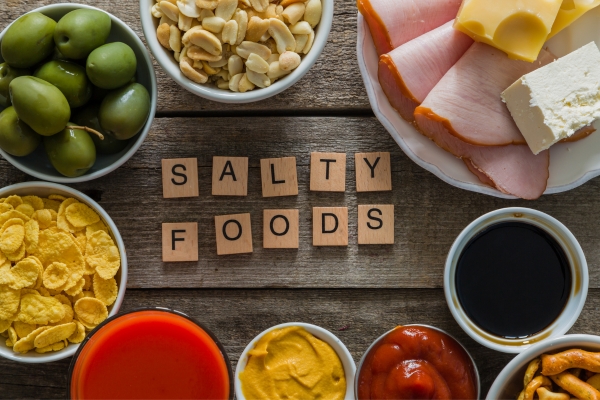
9. High-Sodium Foods
Consuming high-sodium foods can lead to elevated blood pressure and poor circulation, both of which can indirectly affect prostate health.
High blood pressure reduces the efficiency of blood flow throughout the body, including to the prostate, which can contribute to inflammation and exacerbate prostate issues such as benign prostatic hyperplasia (BPH).
Excessive sodium intake is linked to fluid retention, which can worsen urinary symptoms commonly associated with prostate problems.
A high-sodium diet can also contribute to more serious conditions like heart disease and stroke, further compounding overall health risks. [8]
Examples of high-sodium foods include the following:
- Chips (potato chips, tortilla chips, flavored snacks)
- Canned soups (chicken noodle, tomato, cream-based varieties)
- Processed snacks (pretzels, crackers, popcorn)
- Frozen dinners and meals (TV dinners, frozen pizzas)
- Processed meats (bacon, ham, sausage)
- Instant noodles (ramen, cup noodles)
- Pickles and pickled vegetables
- Salted nuts
- Canned beans and vegetables (especially those packed in salty brine)
- Condiments (soy sauce, ketchup, BBQ sauce, salad dressings)
- Sauces and gravies (instant gravy mix, Alfredo sauce)
- Packaged rice and pasta mixes (boxed macaroni and cheese, flavored rice)
- Fast food (burgers, fries, chicken sandwiches)
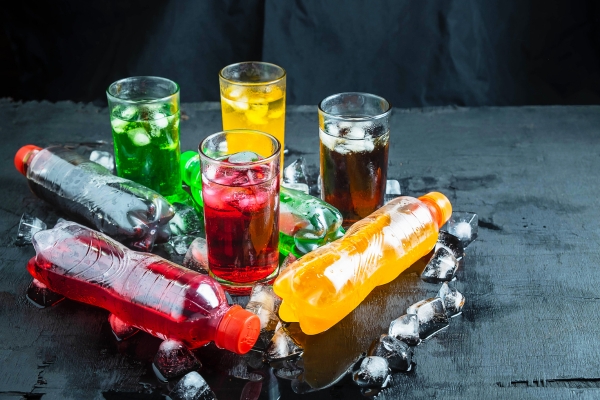
10. Soda and Sugary Drinks
Soda and sugary drinks are packed with excessive sugar and artificial chemicals that can wreak havoc on your health, including your prostate.
These beverages lead to rapid spikes in blood sugar, which contribute to insulin resistance and chronic inflammation—two factors closely linked to prostate problems.
Regular consumption of sugary drinks is also associated with weight gain and obesity, both of which increase the risk of benign prostatic hyperplasia (BPH) and prostate cancer.
Additionally, many sugary drinks contain artificial sweeteners and preservatives that can further disrupt hormonal balance and promote inflammation. [9]
Examples of soda and sugary drinks include the following:
- Regular soda (cola, root beer, lemon-lime soda)
- Sugary energy drinks (Red Bull, Monster, Rockstar)
- Fruit punch
- Sweetened iced tea (bottled sweet tea, canned iced teas)
- Lemonade (pre-packaged or store-bought versions)
- Flavored sports drinks (Gatorade, Powerade)
- Flavored coffee drinks (frappuccinos, caramel macchiatos)
- Slushies and frozen drinks
- Sweetened fruit juices (apple juice, grape juice, orange juice with added sugar)
- Pre-sweetened bottled water (flavored water drinks)
- Smoothies made with added sugar or syrups
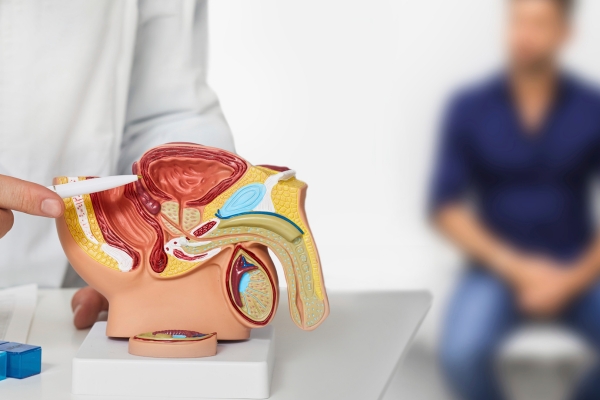
Protect Your Prostate with Smarter Choices
Changing your diet can be challenging, especially when it comes to eliminating some of your favorite foods.
However, understanding the impact of the ten worst foods for prostate health is a crucial step in protecting your long-term well-being.
By avoiding these inflammation-inducing, hormone-disrupting, and processed options, you can significantly lower your risk of prostate issues and improve your overall health.
Instead of focusing solely on what to avoid, think about the prostate-friendly foods you can incorporate into your diet to support healthy function.
Small, sustainable changes—such as swapping out processed grains for whole grains, reducing your sugar intake, or choosing lean proteins over red or processed meats—can have a profound effect over time.
Start making these adjustments today, and your prostate will thank you for it.
References
World Journal of Men's Health
Sargsyan A, Dubasi HB. Milk Consumption and Prostate Cancer: A Systematic Review. World J Mens Health. 2021 Jul;39(3):419-428. doi: 10.5534/wjmh.200051. Epub 2020 Jul 27. PMID: 32777868; PMCID: PMC8255404.
Prostate
Stott-Miller M, Neuhouser ML, Stanford JL. Consumption of deep-fried foods and risk of prostate cancer. Prostate. 2013 Jun;73(9):960-9. doi: 10.1002/pros.22643. Epub 2013 Jan 17. PMID: 23335051; PMCID: PMC3756514.
Biomolecules
Macke AJ, Petrosyan A. Alcohol and Prostate Cancer: Time to Draw Conclusions. Biomolecules. 2022 Feb 28;12(3):375. doi: 10.3390/biom12030375. PMID: 35327568; PMCID: PMC8945566.
British Journal of Nutrition
Miles FL, Neuhouser ML, Zhang ZF. Concentrated sugars and incidence of prostate cancer in a prospective cohort. Br J Nutr. 2018 Sep;120(6):703-710. doi: 10.1017/S0007114518001812. Epub 2018 Jul 26. PMID: 30047347; PMCID: PMC6123266.
British Journal of Cancer
Jian L, Zhang DH, Lee AH, Binns CW. Do preserved foods increase prostate cancer risk? Br J Cancer. 2004 May 4;90(9):1792-5. doi: 10.1038/sj.bjc.6601755. PMID: 15208621; PMCID: PMC2409746.
Nutrients
Sciacca S, Lo Giudice A, Asmundo MG, Cimino S, Alshatwi AA, Morgia G, Ferro M, Russo GI. Prostate Cancer Severity in Relation to Level of Food Processing. Nutrients. 2023 Sep 16;15(18):4010. doi: 10.3390/nu15184010. PMID: 37764793; PMCID: PMC10537278.
BMC Urology
Bello II, Omigbodun A, Morhason-Bello I. Common salt aggravated pathology of testosterone-induced benign prostatic hyperplasia in adult male Wistar rat. BMC Urol. 2023 Dec 11;23(1):207. doi: 10.1186/s12894-023-01371-x. PMID: 38082261; PMCID: PMC10712029.
British Journal of Nutrition
Miles FL, Neuhouser ML, Zhang ZF. Concentrated sugars and incidence of prostate cancer in a prospective cohort. Br J Nutr. 2018 Sep;120(6):703-710. doi: 10.1017/S0007114518001812. Epub 2018 Jul 26. PMID: 30047347; PMCID: PMC6123266.

